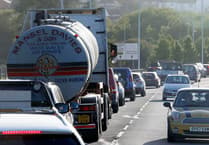I AM relocating into Aberystwyth town centre. Fourteen miles and a different world. Rarely does moving such minor distance involve such dramatic shifts in rhythm, environment, and community philosophy. So, before I leave this lush idyll, before I submit to town life, before I lose the authority to speak as an authentic hill dweller, let us have a last word about the uplands.
Upon arrival, fourteen years in November, the initial compromise to out-of-town living was no longer being reliant on a timer, on valves to spin, no magic switch to thaw an icy home. Learning that chopping logs warms more rapidly than burning logs.
For it is impractical to pipe gas to these parts. As it is often impractical to provide a mobile signal, reliable broadband, and in places, water. It remains mysteriously impractical to travel around here; no Rural Fuel Duty Relief extension for rural Wales, nor useful public transport (buses pass through on three weekdays). Only recently has it become practical to deliver supermarket groceries, but fourteen miles remains an impossible hurdle for Domino’s Pizza, Deliveroo and Just Eat. It remains doggedly impractical to provide genuinely affordable housing, and now heating.
Of course, ‘impractical’ is a delicate euphemism for ‘not worth it’. Farmers, agricultural workers, retirees, creatives, ex-hippies and other members of Welsh rural communities are not worth offering services the wider population takes for granted. It is not worth delivering to the rural communities whose daily graft is to supply the food in those takeaway boxes.
Maybe countryfolk make simple living look too straightforward. But those eking out an existence among these hills understand the logistics of their lives are neither simple nor straightforward. Those raising our meat and tending our produce have daily wrestles with impossible feed, fertiliser and diesel costs, shifting regulations, while puzzling together efficient new technologies with proven local knowledge. And in doing so, the custodians of the Welsh countryside deploy the levels of effort few town-dwellers can imagine.
No less, the women and men raising the next generation of countryfolk in these precarious communities know the job is neither straightforward nor the simplest option. As do those who operate the village shop, the village hall, the village pub; all those offering local service out of a sense of community obligation long lost elsewhere. Staying apart, pulling together.
It is all too easy to take such self-sufficient and uncomplaining communities for granted, too easy to shift the stoic down the priority list. Taking the countryside for granted, along with the folk who live and work here, is a chief reason rural areas remain stubbornly poorly supported in terms of public transport, infrastructure and relief.
But now is the worst possible time to take rural stoicism for granted. The cost-of-living crisis is particularly alarming for the people of the Welsh countryside. It is not so simple to economise out here, not so straightforward to find better paying work.
Yet out-of-towners are worth supporting. Not least because the future of Welsh rural life lies in these rough and ruddy hands. So now more than ever it is incumbent on the region’s elected representatives to pay closer attention to the immediacy of the economic crisis in the hills. To press loudly, persistently and successfully for fair fuel and travel subsidies; to provide the critical relief under-resourced rural communities urgently require in order to maintain their integrity.
Established households are already upping sticks. Cottages on the market at prices out of reach for struggling locals (the quick maths of increasing landlord regulation plus booming property prices). And if this unscheduled displacement foreshadows any broader priced-out, fuel-poverty induced rural exodus, it is a shift in a fragile population that will prove an irreplaceable and destabilising loss for us all.
Oh bollards!
On a townie topic, I know damaging the car on one of those camouflaged bollards in Tesco’s shadowy carpark is my fault. I concede I should have thought to bring along the night-vision goggles.
Black posts in a murky, poorly lit carpark? Tesco, help us out. Install your posts (if you really must) but colour them brightly so they become significantly more visible for drivers pulling away. An unexpected bill I could well do without right now.

.png?width=209&height=140&crop=209:145,smart&quality=75)



Comments
This article has no comments yet. Be the first to leave a comment.